How to Find Your IP Address
Locating your IP address is easy with this step-by-step guide for all your favorite devices.

- Your IP address serves as your digital home address on the internet.
- Safeguarding your IP address is essential to personal cybersecurity, and tools such as VPNs will prevent cybercriminals from accessing this information.
- Knowing your IP address can be useful for troubleshooting network issues, enabling remote access, and participating in online gaming.
In a world where the internet plays a central role in our daily lives, understanding the fundamental concept of an IP address is similar to knowing your way around a bustling city. Your IP address serves as the digital home address of your device, and learning how to find it is an essential skill for any internet user. But don’t worry, unlike your Social Security number, you won’t have to memorize this long string of numbers. You’ll just need the right tools to look it up whenever you need it.
From iOS to Android to Mac to Windows, the steps to uncover this information vary, making finding this information between your devices a bit different each time. In this comprehensive guide, we’ll unravel the mystery of finding your IP address, equipping you with the knowledge and tools to find your unique digital identifier on various platforms and operating systems.
Our Video on How to Find Your IP Address
Prefer to watch the video version of this article? Check out our video:
An Overview of Finding Your IP Address
- What’s an IP Address?
- Why Do I Need to Know My IP Address?
- How to Find Your IP Address on Mobile Devices
- How to Find Your IP Address on a Computer
- How to Find Your Public IP Address
What’s an IP Address?
An IP address, or Internet Protocol address, is a numerical label assigned to each device connected to a computer network, which serves as a unique identifier. Having your IP address handy can help you troubleshoot network issues, diagnose connectivity problems, set up remote access on your computer or network, and increase online privacy and security. When you have your IP address, you can mask it with a Virtual Private N
etwork (VPN), which enhances privacy, shields sensitive data, and grants access to geo-restricted content.
We’re constantly hearing in the news about new scams or information breaches, so it’s natural to get a little weary about how you’re spending time online. Knowing and using your IP address to protect your information can prevent you from being susceptible to cybercrime.
IP Address and Internet Security: Cybercriminals may use your IP address to target your specific device or location, potentially leading to various cyberattacks. To mitigate this risk, consider using a VPN (Virtual Private Network) to mask your true IP address and protect your online identity. VPNs route your internet traffic through secure servers, assigning you a different IP address and making it significantly harder for cybercriminals to identify and target you.
What’s the Difference Between a Public IP Address and a Local IP Address?
A public IP address is a unique numerical label assigned to a device on a network, enabling it to communicate with other devices globally. Your ISP provides this number, and it identifies a device on the internet.
In contrast, a local IP address is used within a private network, like a home or office, to identify devices and facilitate communication within that network. Local IP addresses aren’t globally unique and are assigned by a router or a Dynamic Host Configuration Protocol (DHCP) server in a local network, allowing multiple devices to share the same IP address while remaining distinct within that local network.
Public IP addresses are necessary for internet-based communication, hosting online services, and remote access. Local IP addresses are necessary for local network communication, security, and device management within a private network. For example, your printer’s IP address would be the local number. If you’re ever online and unsure which one to enter, try them both out and allow the process of elimination to point you in the right direction.
Why Do I Need to Know My IP Address?
Knowing your IP address can be valuable, enabling you to manage your online activities effectively, maintain security, and troubleshoot network-related problems. Below are some reasons why you might be searching for your IP address:
- Troubleshooting network issues: When your internet connection is unstable or not working correctly, knowing your IP address can help tech support diagnose and resolve the problem more effectively.
- Configuring network devices: Setting up routers, printers, or other network devices requires knowledge of your IP address to assign the correct configurations and ensure proper functionality. You may also need it to change your Wi-Fi password.
- Remote desktop access: To access your computer or network remotely, you’ll need your IP address to establish a secure connection, which will allow you to retrieve files, troubleshoot issues, or perform tasks from a different location. Stay safe if you’re ever requested to grant remote access, and only share your IP address with a safe person or entity.
- Online security: Understanding your IP address is crucial for protecting your online privacy and security, and it’s necessary for configuring firewalls or implementing a VPN to hide your true IP address. It’s like being your own personal detective.
- Tracking stolen devices: If your laptop or smartphone is stolen, knowing the IP address can assist law enforcement (or you) in tracking the device’s location if it connects to the internet.
- Monitoring network activity: Network administrators often use IP addresses to monitor and analyze network traffic, identifying potential security breaches or performance issues.
- Online gaming: Gamers might need to know their IP address for multiplayer gaming, setting up private servers, or participating in LAN parties where local network play is involved.
- Hosting a website or server: If you’re running a website or an online game server from your own computer, you’ll need your IP address to make it accessible online.
IPv4 vs. IPv6: There are two types of IP addresses: IPv4 and IPv6. IPv4 is the older style of IP address that uses a numerical dot-decimal notation (192.168.0.1). Even though it’s still valid today, only 4.3 billion of these addresses are available because of its 32-bit infrastructure, and they are often reused. In comparison, IPv6 is the future of IP addresses, as it features a 128-bit infrastructure with alphanumeric hexadecimal notation (7bcf:260c:2600…), uses unique addresses for every device, and supports autoconfiguration. Our guide covers how to find each type of IP address.
How to Find Your IP Address on Mobile Devices
The steps to finding your IP address on your mobile device will vary based on your operating system. Below are the steps for uncovering this information on two of the most popular mobile phone devices, iOS and Android:
How to Find Your Local IP Address on an iPhone
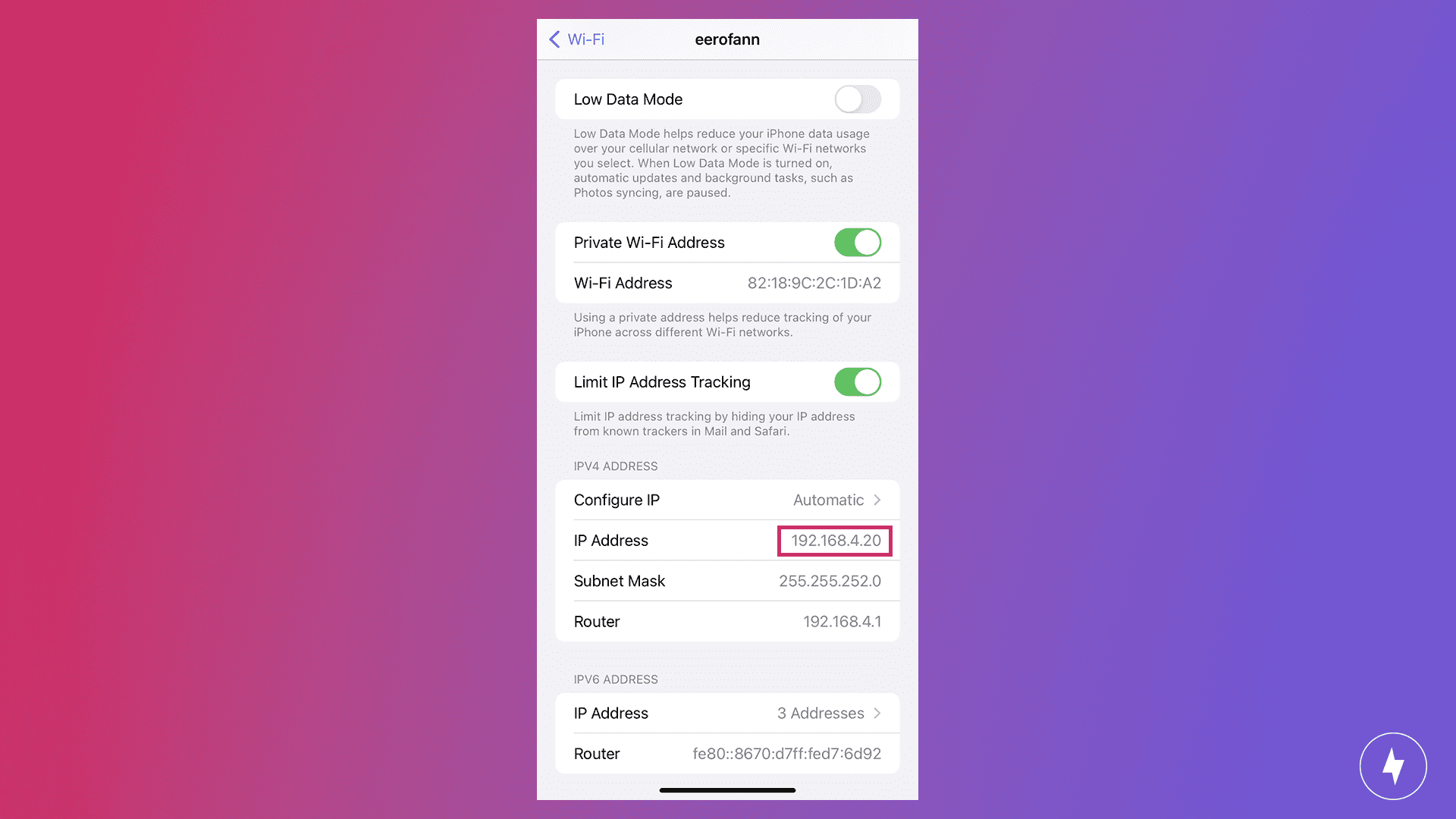
- Navigate to Settings.
- Select Wi-Fi.
- Beside your Wi-Fi network name, press the lowercase “i” button.
- Under IPv4 Address, locate your IP Address.
How to Find Your Local IP Address on Android
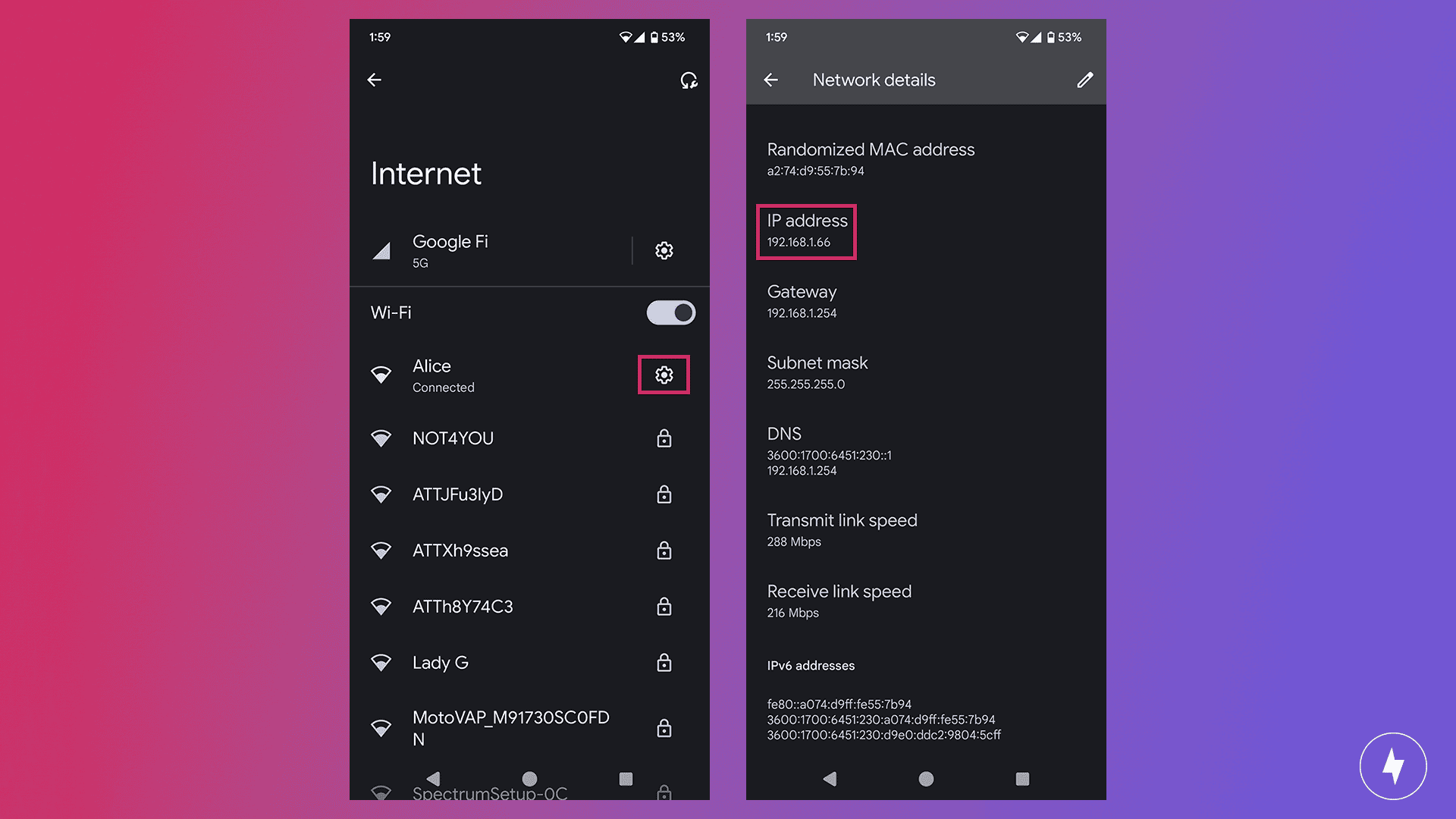
- Navigate to Settings.
- Select Network & internet.
- Select Internet.
- Beside your Wi-Fi network name, press the cog icon.
- Scroll down to locate your IP address.
While the steps above are for a Google Pixel device on Android, your steps will differ if you utilize a Samsung device. If you have a Samsung phone, follow this path: Settings > Connections > Wi-Fi > Your Network > IP Address.
How to Find Your IP Address on a Computer
Similar to mobile devices, the steps to locate your IP address on a computer will vary based on your operating system. In the steps below, we cover how to find your IP address on Mac, Windows 10, and Windows 11:
How to Find Your Local IP Address on a Mac
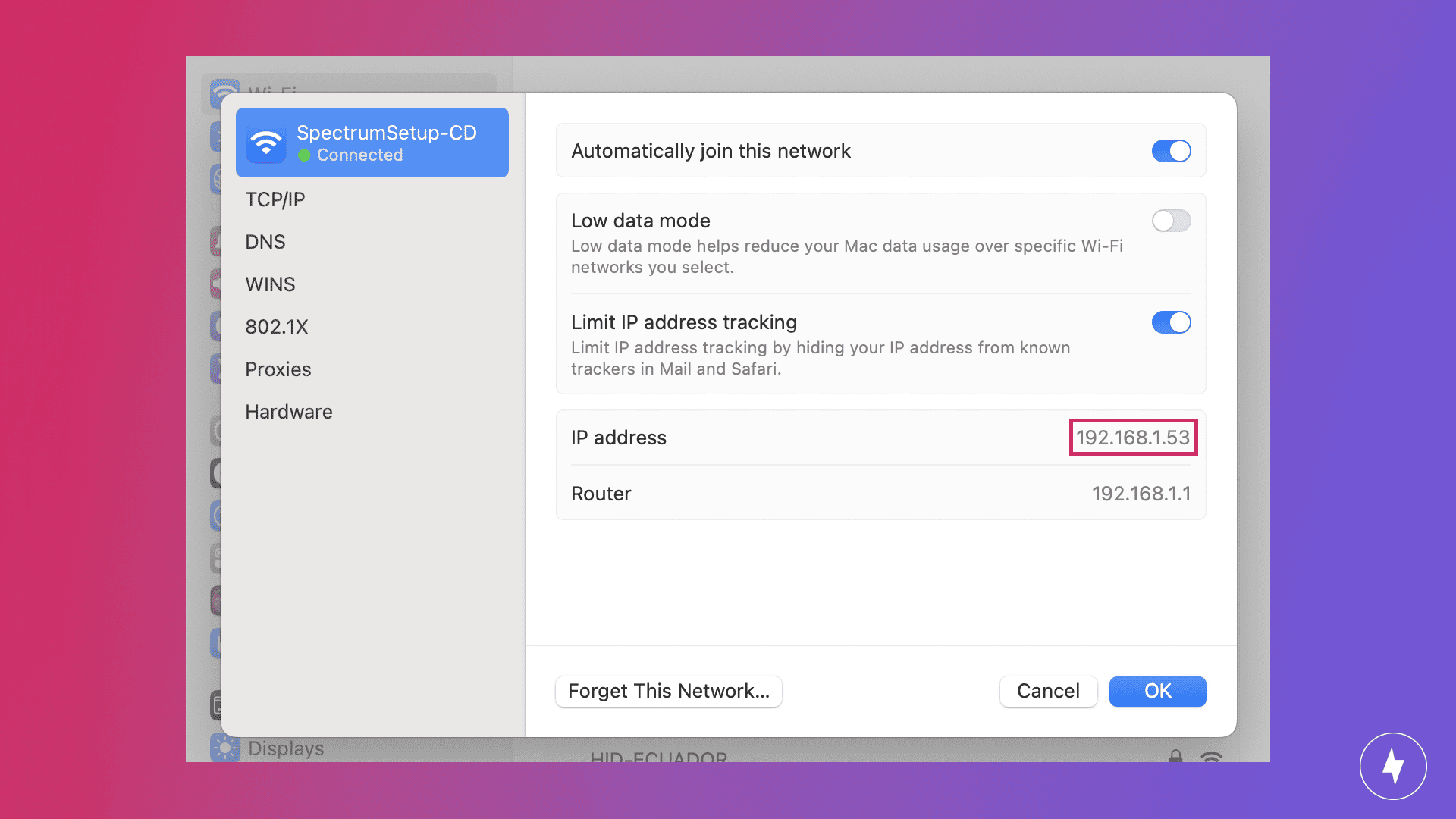
- Navigate to the Apple logo from the menu bar at the top left.
- Select System Preferences.
- Select Network.
- On the left side of the menu, select your Connection.
- Below the Status section, locate your IP address.
How to Find Your Local IP Address on Windows 10
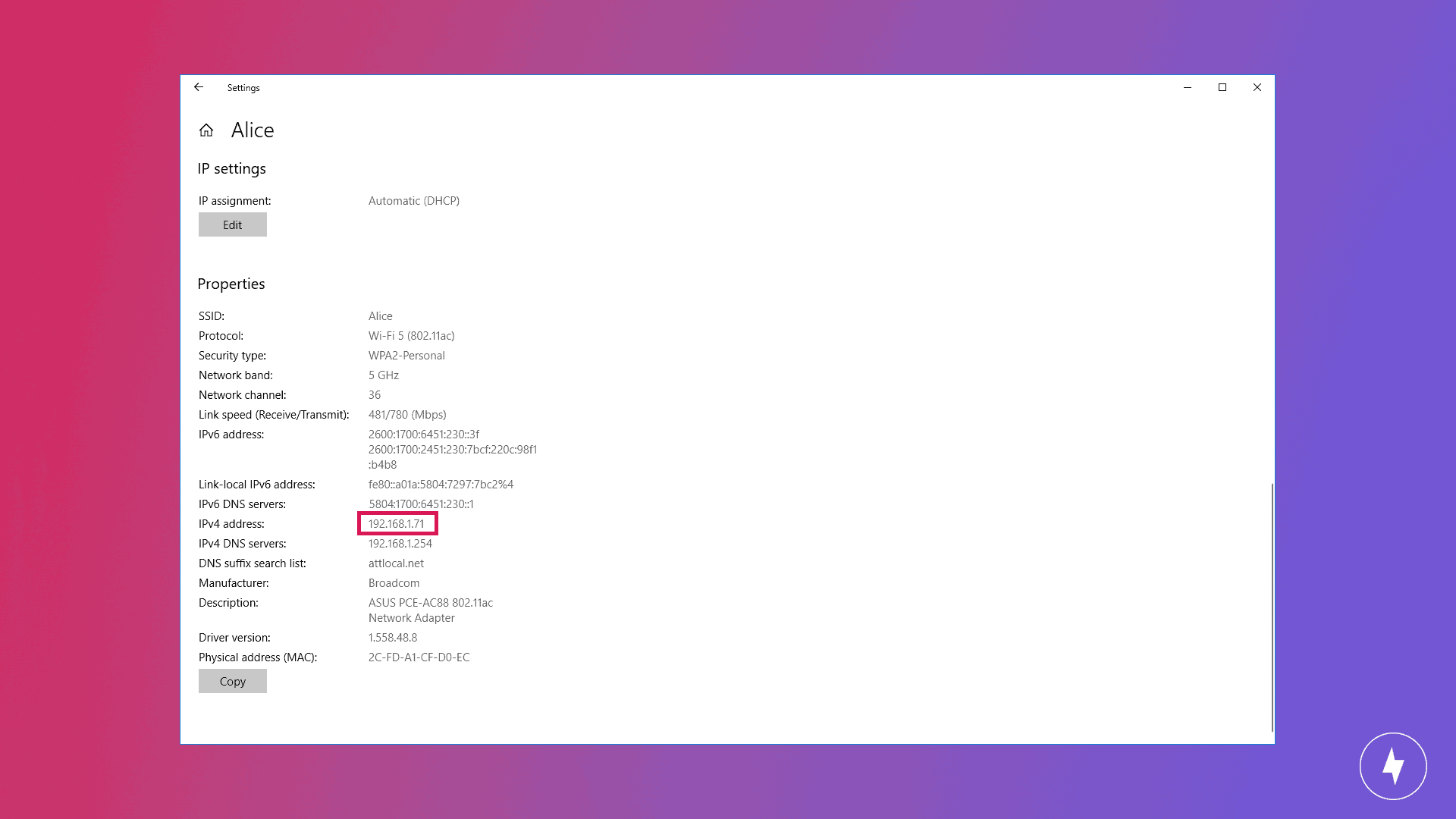
- Navigate to the Start menu.
- Click the Settings cog.
- Select Network & Internet.
- Click Properties under your current Wi-Fi network.
- Beside IPv4 address, locate your IP address.
How to Find Your Local IP Address on Windows 11
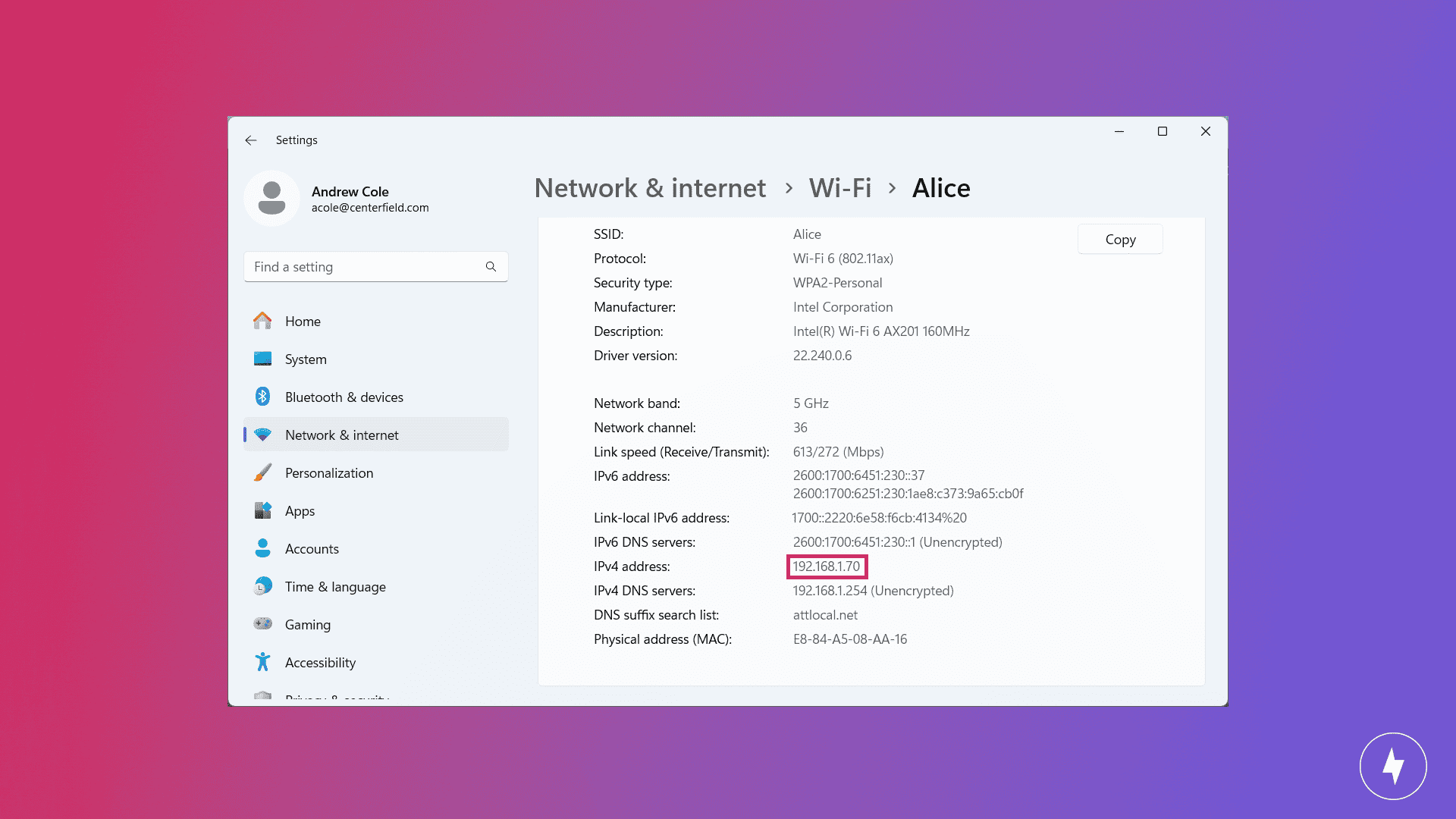
- Navigate to the Start menu.
- Search for and select Wi-Fi Settings.
- Click Properties next to your Wi-Fi network name.
- Beside IPv4 address, locate your IP address.
How to Find Your Local IP Address on Windows With Command Prompt
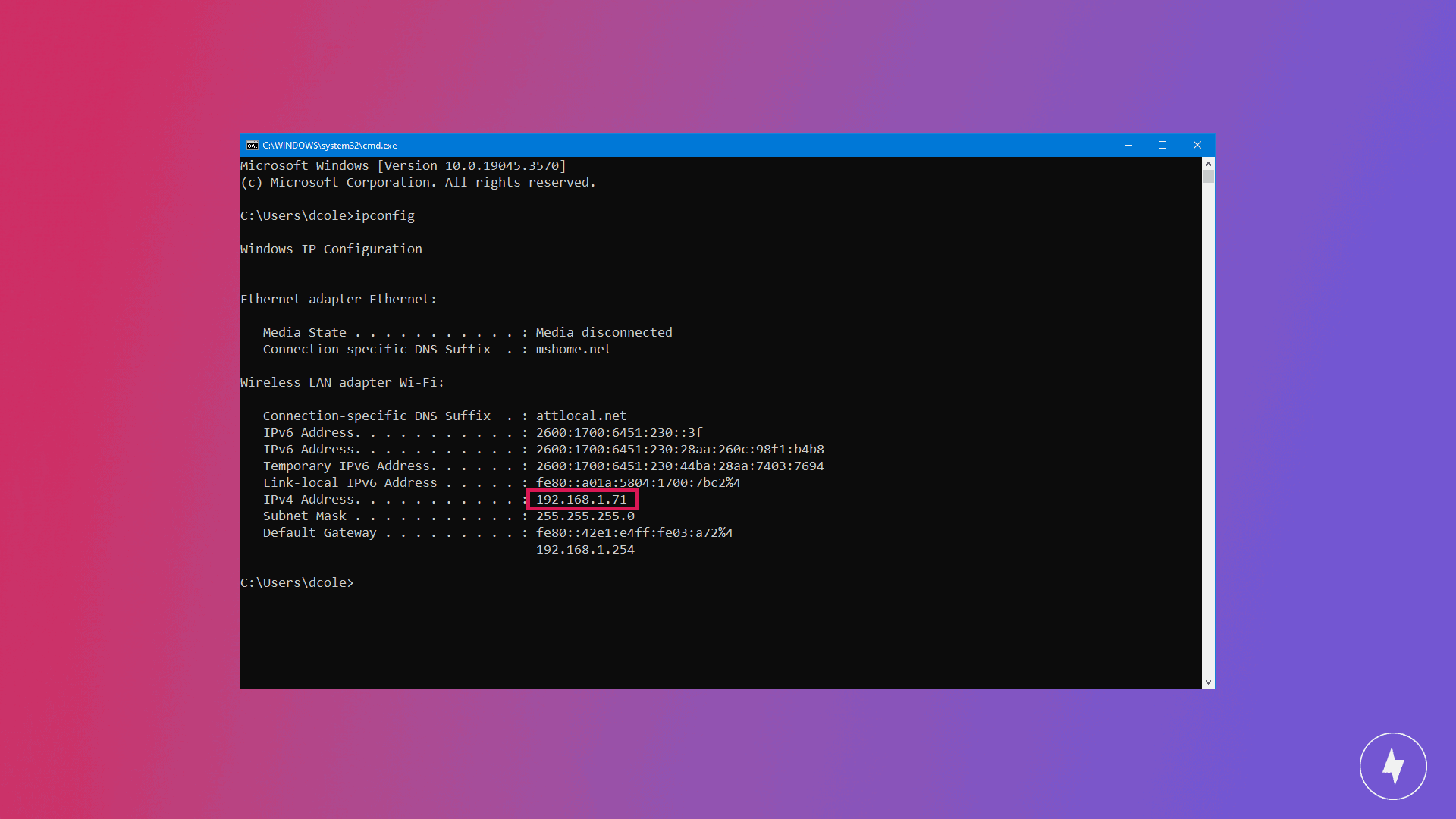
- Navigate to the Start menu.
- Open Command Prompt after typing it into the search bar.
- Type “ipconfig” into the console.
- Beside IPv4 Address, locate your IP address.
How to Find Your Public IP Address
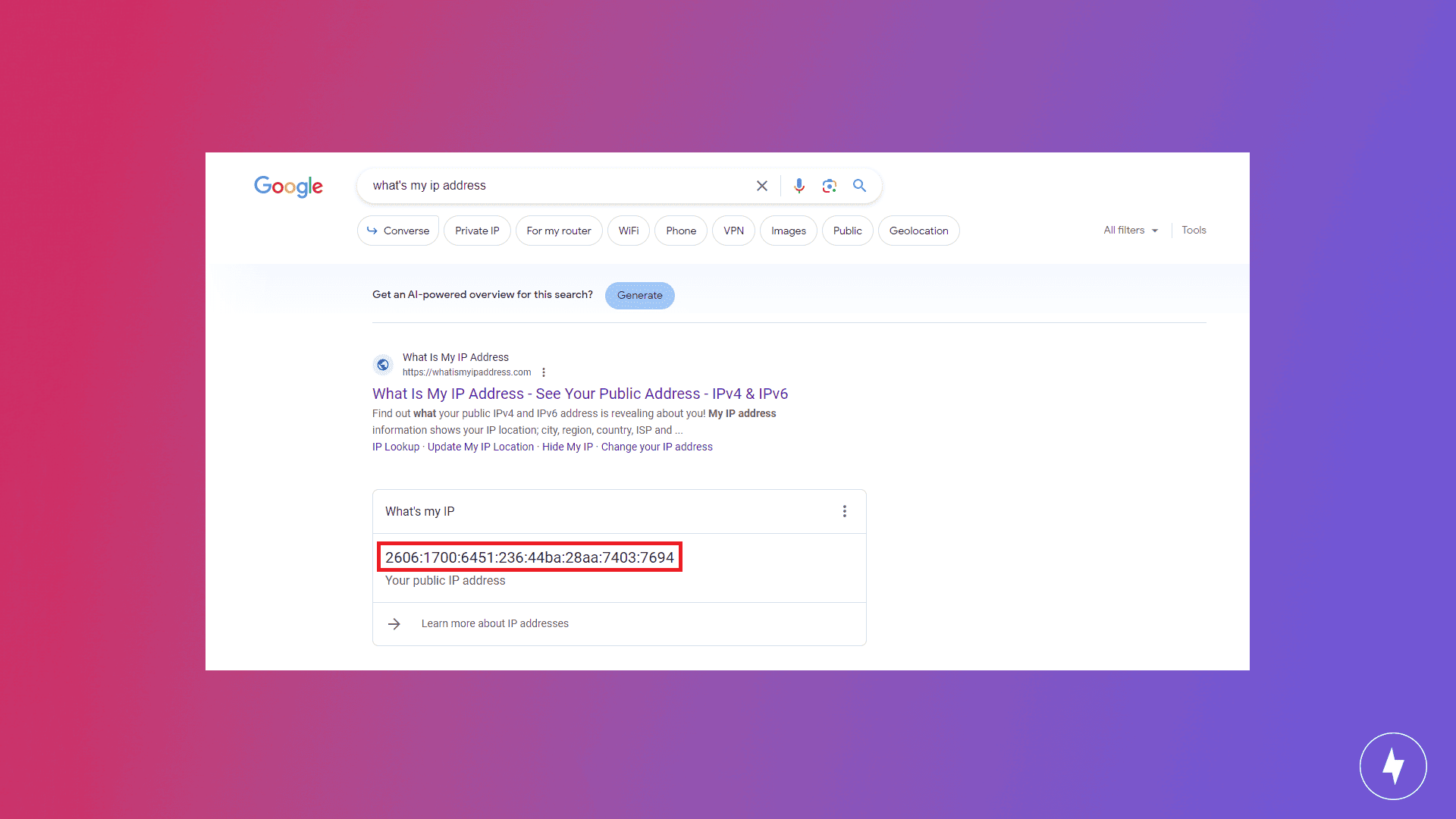
Locating your public IP address is relatively simple and can be done with a quick Google search, or by using a public IP address lookup website such as WhatIsMyIP.com or WhatIsMyIPAddress.com. To find this information on Google, simply type in “what’s my ip address” or a similar phrase, and the number will populate automatically in your search results.
Frequently Asked Questions About IP Addresses
Does my Wi-Fi have an IP address?
Yes, your Wi-Fi network is connected to the internet via your router, which has a unique IP address. This address represents your network and helps your devices communicate with other networks over the internet.
Where do I find my IP address on my router?
Find your router’s IP address by checking the label on the router itself, reviewing the device settings on your computer or phone, or logging into the router’s web interface through a browser. Common IPs like “192.168.1.1” or “10.0.0.1” are often used, but you can confirm the exact address in your device’s network settings or by running a quick IP check on your computer.
What does an IP address look like?
An IP address is a series of numbers separated by periods. It consists of four sections of numbers, such as “192.168.123.123.”
Can anyone see my IP address?
Websites, apps and other online services can see your public IP address, which is essential for internet communication. However, personal information isn’t directly visible through the IP, though it can give clues about your general location, such as the city or region.
Can my IP address be traced to my home?
Your IP address can give a general location, often accurate to your city or region, but not your exact address. Only your internet service provider (ISP) can link your IP directly to your home, and they require a legal warrant to disclose that information.